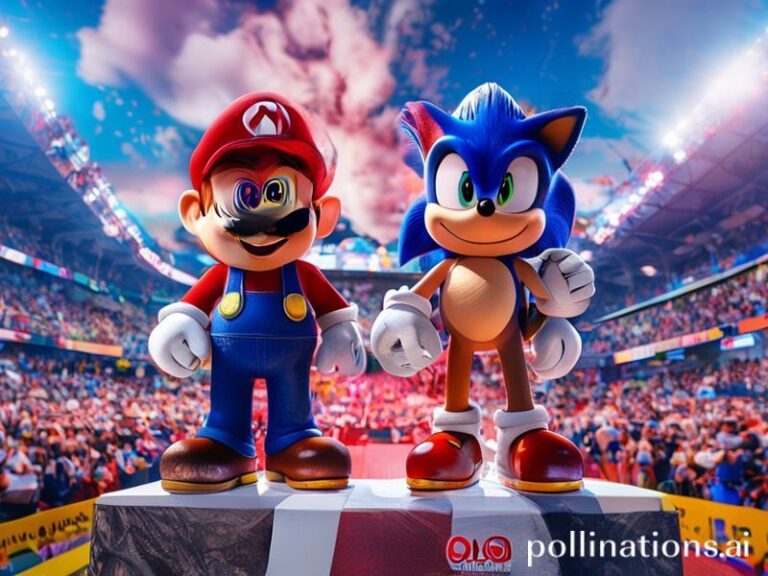Sharon Hodgson vs. the Global Nugget: How One British MP’s School-Lunch Crusade Became a Mirror for Planetary Gluttony
**The Unlikely Global Ripple of Sharon Hodgson: How a British MP’s Crusade Against Childhood Obesity Became a Mirror for the World’s Gluttony**
*By Our Man in the Departures Lounge, Still Recovering from Airline Food*
LONDON—Across the river from the glass sarcophagus that houses Parliament, Sharon Hodgson is quietly waging war on chicken nuggets. To the untrained eye she’s merely the Labour MP for Washington and Sunderland West, chair of the All-Party Parliamentary Group on School Food, and possessor of a haircut that screams “I have neither the time nor the cholesterol for nonsense.” To the rest of the planet, however, her decade-long campaign to feed Britain’s children something that didn’t previously glow in the dark has become a Rorschach test for how societies choose to poison their young.
Start with the obvious: 159 million children worldwide are stunted by malnutrition while simultaneously 39 million under-fives are overweight. Somewhere in that Venn diagram of cosmic cruelty, Hodgson’s push for free school meals and stricter junk-food marketing sits like a moral speed-bump. The policy itself is parochial—who gets a hot lunch in Gateshead—but the subtext travels first-class. If a faded imperial power can’t stop its toddlers from mainlining saturated fat, what hope has Guatemala, where Coca-Cola is cheaper than water and diabetes is the new national anthem?
Hodgson’s genius, if we can use such a grand word for someone who looks like your auntie calculating the split bill at a funeral, is to weaponize boredom. She filibusters with facts: a five-year-old’s recommended daily sugar intake dissolved in one bowl of Frosties, the £5.2 billion NHS will spend on obesity-related amputations before today’s kindergarteners reach their first payday loan. Colleagues drift into REM sleep; the Statutory Instrument passes. It’s democracy as palliative care—slow, underfunded, but still technically breathing.
Internationally, the ripple effects are deliciously hypocritical. American lobbyists—fresh from declaring pizza a vegetable in school lunches—watch Westminster’s debate like vampires at a garlic festival. Brazil’s meat barons, already traumatized by Brussels’ deforestation rules, fear a Hodgson-inspired EU amendment could outlaw Happy Meals as a gateway drug. Even Japan, whose school lunches resemble Michelin haiku, monitors the discourse in case “Western decadence” tries to sneak trans-fats back through the side door of cultural exchange.
Meanwhile, the global South absorbs the insult twice. First, commodity traders dump surplus high-fructose corn syrup on ports where governance is a part-time hobby. Then, when Type-2 diabetes blossoms like a malignant flower, WHO fact-sheets quote Hodgson’s parliamentary questions as best-practice templates. It’s colonialism with extra vitamins—your kids get the amputations, ours get the white paper.
The pandemic, that great revealer of societal stretch marks, handed Hodgson a trump card. When Marcus Rashford forced the Treasury into a screeching U-turn on holiday hunger, the MP was already waiting with spreadsheets and a told-you-so smirk worthy of French existentialism. Overnight, feeding poor children became the new clapping for the NHS: performative, temporary, and swiftly forgotten once the cameras pivoted back to a ministerial affair. Yet the precedent scuttled across borders. In South Africa, NGOs now cite “the Hodgson amendment” when lobbying to keep school feeding schemes alive. In India, where midday meals have existed since 1925, her cost-benefit ratios are weaponized by bureaucrats fighting to prevent them from being privatized into a Unilever CSR PowerPoint.
Predictably, the cynics argue she’s merely delaying the inevitable: kids who learn to crave kale will still graduate into adulthood’s buffet of existential despair—gig contracts, housing costs, climate collapse—eventually self-medicating with whatever deep-fried serotonin they can swipe on credit. But that’s missing the point. Hodgson’s crusade isn’t about ending human weakness; it’s about removing the industrial conveyor belt that profits from it. In a world where BlackRock portfolios depend on quarterly nugget sales, insisting a ten-year-old from Hartlepool deserves a carrot is, curiously, a revolutionary act.
So here we are. One woman with a reusable cup has managed to export a moral question faster than Britain’s post-Brexit trade delegations could flog pork pies to Vietnam: do nations have the right to monetize the hunger of their own offspring, or is that simply the free market’s adorable phase of teenage rebellion? The answer will determine whether the 21st century ends in glucose-induced blackout, or merely a resigned burp.
Either way, Sharon Hodgson will still be here, tabling amendments at 2 a.m., sustained by lukewarm tea and the quiet fury of someone who has read the fine print on a packet of crisps. The planet will continue to rotate, children will continue to grow—sideways, upwards, or not at all—and somewhere a lobbyist will bill £800 an hour to rebrand “obesity” as “alternative thinness.” History may not remember her name, but the pancreases of future generations will.







